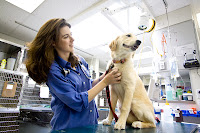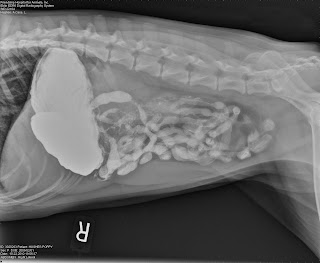Poppy and I had a scare recently and it is a great example of what can happen when your dog develops vomiting, diarrhea, lethargy and anorexia. These signs are probably the most common presenting complaints I see on emergency at Friendship. One morning Poppy wouldn’t eat her breakfast and then proceeded to vomit about four or five times. I didn’t think too much about it until she vomited again a few hours later.
At this point I was considering multiple causes for the vomiting, there are about a million of them, but I didn’t really care one way or the other as long as it stopped. I headed to the hospital to pick up injections of two anti-nausea medications; that would hopefully make her feel better. After giving the injections she didn’t vomit again but still refused dinner and was acting very quiet, not at all like her usual obnoxious self.
The next day when I was getting ready for work she bolted outside and had profuse diarrhea. At this point I decided it was time to bring her into the hospital for diagnostics and more aggressive treatment. I was concerned that she could have a foreign body, which can cause an obstruction or inflammation as it moved through her intestines. She could also have gastrointestinal inflammation from pancreatitis, a parasitic infection, a virus or something she ate that didn’t agree with her.
First thing we did upon arriving at Friendship was to take some x-rays to see if there was any evidence of something foreign in her GI tract. The results were suspicious that she was obstructed; there were very dilated loops of small intestine filled with gas and fluid. I started her in intravenous fluids, this would rehydrate her which not only makes her feel better but also lubricate the intestines helping to move along anything that is stuck.
Bloodwork consisting of a complete blood count and chemistry profile did not show any abnormalities. After she had been on fluids for about six hours I repeated the x-rays of her belly and unfortunately not very much had changed. At this point I was becoming more concerned that she had an obstruction and surgery would be in her future. I asked our internist, Dr. McConnell, if he would ultrasound her abdomen to see if that was more conclusive than the x-rays.
Dr. McConnell found that she had a large amount of inflammation in her gastrointestinal tract but nothing that indicated she had an intestinal obstruction. He recommended that we continue to monitor her or perform a barium series. I opted for the latter, which consist of giving her a material that shows up white on x-ray and then take serial films to watch it move through. Theoretically it would highlight any foreign material or obstructions that may be present.
The barium series was also concerning as the liquid was very slow to move out of her stomach and through her intestines. Since she seemed to be feeling better so we continued to monitor her overnight. The next morning another recheck x-ray showed there was still a small amount of barium in her stomach, which is definitely abnormal. I prepared to take her to surgery later that day so I could perform an abdominal exploratory to look for foreign material.
Given my appointment schedule that day I could not go into surgery until late afternoon. I decided to take one last x-ray and amazingly all of the barium had finally moved out of her entire GI tract. She had also perked up and started barking at other dogs that walked by her cage, definitely a sign that she was feeling better. I did not perform surgery but took her home instead with a bland diet and medication for the diarrhea. She continued to improve over the next few days and was soon back to normal.
 In some cases the vomiting and diarrhea doesn’t improve with IV fluids and medications. In these cases we need to go to surgery to look for a possible obstruction. It is important to watch the patient and frequently assess how she is doing. If she isn’t getting better then I know I have to be more aggressive with diagnostics and treatment.
In some cases the vomiting and diarrhea doesn’t improve with IV fluids and medications. In these cases we need to go to surgery to look for a possible obstruction. It is important to watch the patient and frequently assess how she is doing. If she isn’t getting better then I know I have to be more aggressive with diagnostics and treatment. I hope this story about Poppy’s ordeal helps you to understand the thought process veterinarians work through when treating a patient for vomiting and diarrhea. And if you find one of your pets is sick perhaps this will help you work with your vet to get your pet back to normal.












No comments:
Post a Comment